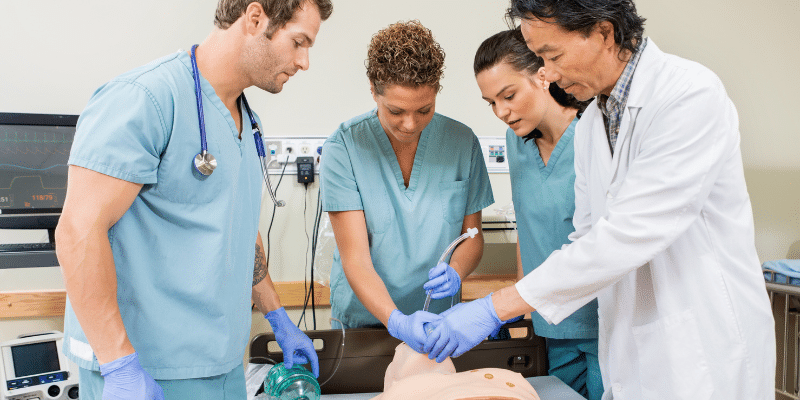Simulation training has become an integral part of healthcare education, revolutionizing the way future professionals prepare for real-world scenarios. At ABES, the focus on simulation training equips students with practical skills and confidence, ensuring they are ready to excel in their healthcare careers.
In this post, we’ll go over the following key benefits of simulation training in detail:
• Realistic Clinical Scenarios: Advanced technology bridges theory and practice.
• Confidence Building: Safe environments for hands-on practice and feedback.
• Teamwork and Communication: Collaborative simulations enhance skills.
• Patient Safety: Risk-free training improves safety and outcomes.
• Tech-Forward Learning: Stay updated with the latest healthcare innovations.
• Proven Impact: Effective training backed by studies and real-world success.
The Role of Simulation Training in Healthcare
Simulation training in healthcare uses advanced technology to create realistic clinical scenarios. These simulations range from simple task trainers, such as intravenous (IV) insertion arms, to complex full-body mannequins that can mimic a wide array of medical conditions. Virtual reality (VR) and augmented reality (AR) are also increasingly utilized, providing immersive environments for students to practice in. This hands-on approach bridges the gap between theoretical knowledge and practical application, making it a cornerstone of modern healthcare education.
Developing Clinical Skills through Simulation
One of the primary benefits of simulation training is the enhancement of clinical skills. Students can practice procedures repeatedly until they achieve proficiency without the risk of harming actual patients. This repetitive practice is crucial for mastering complex tasks, such as catheterization, sterile processing, or administering injections. Through simulation, students gain muscle memory and develop a deeper understanding of the techniques, which translates into better performance in real clinical settings.
Exposure to Diverse Scenarios
Additionally, simulation training allows new students to encounter a diverse range of real-life scenarios they might not frequently see during traditional practicum rotations. By exposing students to rare but critical conditions, simulation ensures they are well-prepared to handle any situation they may encounter in their professional healthcare careers.
Building Confidence in Healthcare Students
Entering the healthcare field can be daunting, especially for those who are new to patient care. Simulation education helps build confidence by allowing students to familiarize themselves with the clinical environment and patient interactions in a controlled, supportive setting. By practicing various scenarios, students can identify and address their weaknesses, reducing anxiety and improving their overall competence. This increased confidence is essential when transitioning from the classroom to the clinical setting.
Supportive Feedback Mechanism
The supportive feedback mechanism inherent in simulation training helps students to refine their skills continually. Constructive criticism and guidance from trained facilitators and content experts enable learners to pinpoint their areas of improvement, fostering a growth mindset that is crucial for long-term professional development.
Developing Critical Thinking and Decision-Making Skills
Healthcare professionals often face high-pressure situations that require quick, decisive action. Simulation training is designed to develop critical thinking and decision-making skills. Students are presented with realistic scenarios where they must assess the situation, prioritize tasks, and implement appropriate interventions. This process hones their ability to think on their feet, make sound judgments, and adapt to unexpected challenges—skills that are invaluable in real-life situations.
Targeted Training for Specific Conditions
Simulated circumstances can be tailored to mimic specific conditions, such as cardiac arrest or a patient in palliative care, giving students a comprehensive understanding of various healthcare protocols. This targeted training ensures that students are not only ready to perform under pressure but also capable of delivering high-quality care in the most demanding circumstances.
Promoting Teamwork and Communication in Healthcare
Effective healthcare delivery relies heavily on teamwork and communication. Simulation training emphasizes these aspects by incorporating scenarios that require collaboration among students. These scenarios often mimic real-world situations where a variety of healthcare professionals must work together to achieve the best patient outcomes.
Collaboration in Simulated Environments
By practicing these interactions in a simulated environment, students learn the importance of clear communication, active listening, and coordinated effort. This collaborative training prepares them for the interdisciplinary nature of modern healthcare.
Debriefing Sessions for Continuous Improvement
Simulation training includes debriefing sessions where teams can reflect on their performance, discuss what went well, and identify areas for improvement. These sessions are invaluable for fostering a culture of continuous improvement and mutual respect among team members.
Enhancing Patient Safety through Simulation Training
Patient safety is a paramount concern in healthcare. Simulation training plays a crucial role in enhancing patient safety by allowing students to practice and refine their skills in a risk-free environment. By identifying and correcting errors during simulations, students can learn from their mistakes without compromising patient well-being. This focus on error reduction and prevention leads to safer clinical practices and better patient outcomes.
Incorporating Safety Protocols in Training
Healthcare simulation training can include the use of checklists and other safety protocols that are critical in real-world healthcare settings. By ingraining these practices early in their education, students develop a solid foundation in patient safety that will benefit them throughout their healthcare careers.
Bridging the Gap Between Theory and Practice
Traditional classroom education provides the theoretical foundation necessary for healthcare practice. However, bridging the gap between theory and practice can be challenging. Simulation training serves as a vital bridge, allowing students to apply theoretical knowledge in practical scenarios. This experiential learning reinforces classroom instruction and deepens understanding, making it easier for students to recall and apply what they have learned when faced with real-world situations.
Encouraging Safe Learning and Skill Development
Mistakes are an inevitable part of the learning process, but in healthcare, errors can have profound consequences. Simulation training provides a safe space for students to learn and make mistakes without fear of harming patients. This environment encourages experimentation and exploration, allowing students to test their limits and expand their skills.
Continuous Learning Through Constructive Feedback
The constructive feedback received during the debriefing part of simulations helps them grow and improve, fostering a culture of continuous learning and development. Furthermore, this safety net promotes a mindset where students are not afraid to ask questions and seek help when needed, which is crucial for their professional growth and the overall improvement of healthcare practices.
Preparing Students with Variety
As mentioned above, simulation training often includes a wide range of scenarios, from common procedures to rare and complex cases. This variety ensures that students are well-rounded in their clinical skills and prepared to handle a broad spectrum of patient needs.
Staying Ahead of Technological Advancements
The healthcare industry is constantly evolving, with innovative technologies and treatment methods emerging regularly. Simulation training helps students stay abreast of these advancements by providing opportunities to work with modern tools and equipment. For instance, VR and AR simulations can replicate the latest surgical techniques or diagnostic procedures, giving students a glimpse into the future of healthcare.
Preparing Graduates for the Future of Healthcare
This exposure to state-of-the-art technologies ensures that graduates are well-prepared to embrace and adapt to innovations in their field. Moreover, by becoming proficient with these advanced technologies during their training, students can become leaders in implementing and utilizing new tools in their future workplaces, driving progress and improvement in healthcare delivery.
Lifelong Learning and Professional Development
Healthcare is a field that demands continuous education and skill development. Simulation training is not limited to students; it is also an invaluable resource for practicing professionals seeking to update their skills or learn new techniques. By participating in simulation exercises, healthcare workers can maintain their proficiency and stay current with industry standards. This commitment to lifelong learning is essential for providing high-quality care and advancing one’s career.
Adapting to Changes in Healthcare Regulations
Additionally, ongoing simulation training can help professionals adapt to changes in healthcare regulations and standards, ensuring they remain competent and compliant in their practice.
Real-World Impact of Simulation Training
Numerous studies and real-world examples highlight the effectiveness of simulation training in healthcare. For instance, a study published in the Journal of the American Medical Association (JAMA) found that simulation-based training significantly improved the performance of surgical residents. Similarly, the University of Toronto’s Centre for Simulation Studies reported a marked reduction in medical errors among nurses who underwent regular simulation training.
Success Stories from Healthcare Professionals
These success stories underscore the transformative impact of simulation on healthcare education and practice. Additionally, testimonials from healthcare professionals who have benefited from simulation training provide compelling evidence of its value. These stories highlight how simulation training has not only enhanced their skills but also increased their confidence and improved patient outcomes.
ABES College and Simulation Training
At ABES, simulation training is becoming an integral part of the curriculum. State-of-the-art simulation labs equipped with high-fidelity mannequins and other advanced tools provide students with a comprehensive learning experience.
The faculty, comprising experienced healthcare professionals, guides students through simulated scenarios, offering personalized feedback and support. This hands-on training, combined with ABES’s strong emphasis on theoretical knowledge, ensures that graduates are well-prepared to excel in their chosen fields.
Furthermore, ABES continuously updates its simulation programs to reflect the latest advancements in healthcare, ensuring that students receive the most current and relevant training possible.
Start Your Healthcare Career with Simulation Training at ABES
Simulation training at ABES equips you with the skills, confidence, and experience needed for a successful healthcare career. By bridging theory and practice and embracing the latest technology, you’ll be ready to meet the challenges of the healthcare industry. Prepare for your future—enroll at ABES today!

Rebecca Cicero
Simulation Coordinator
Rebecca Cicero is a seasoned professional with a passion for the dynamic realm of healthcare simulation. With 15 years of dedicated experience in the field, Rebecca’s commitment to excellence is showcased by her CHSOS certification, a testament to her expertise in health simulation. Known for thriving in fast-paced environments, Rebecca excels at orchestrating intricate simulation scenarios with precision and innovation.
Her journey in the health simulation field has been marked by a genuine love for both the simulation process and the students she guides. Rebecca finds joy in witnessing the transformative power of simulation as a tool for learning and skill development. Beyond her technical proficiency, Rebecca is recognized for her creative approach to simulation, infusing scenarios with imagination to enhance the learning experience.
Her dedication to advancing healthcare education through simulation has not only made her a respected professional in the industry but also a mentor who takes pride in nurturing the growth of future healthcare professionals.


